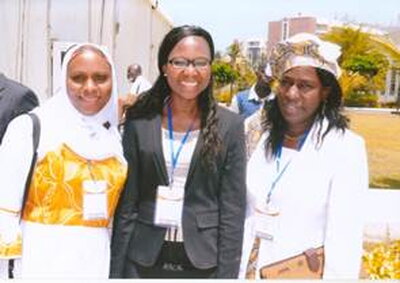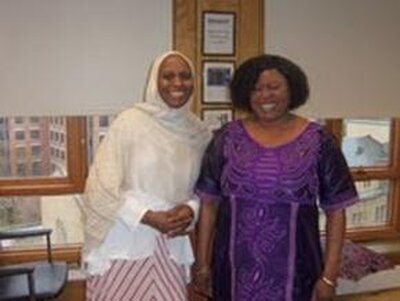

Dr. Maimouna Barro (l.) with colleagues in Dakar. Middle: Dr. Angele Mendy, Universite Gaston Berger (Saint-Louis, Senegal) Alumna, faculty member, Universite de Lausanne (Switzerland) and Right: Professor Fatou Diop Sall, Universite Gaston Berger, Saint-Louis, Senegal.
The month of April was very busy for Dr. Maimouna Barro, Associate Director of CAS. First, she was asked by the Minister of Higher Education and Research of Senegal, Mary Teuw Niane, to participate in a Higher Education Forum in Dakar. The forum was dedicated to the re-vamping of higher education in that country. Dr. Barro, who was born in Senegal and completed her undergraduate work there, was part of a team of experts from the diaspora who were called on to review parts of a major report and discuss their findings in a series of meetings and plenary sessions with several hundred stakeholders, including government leaders, educators, students, trade unionists and representatives of civil society. In the end the group came up with 78 recommendations in the key areas highlighted in the report: governance, financing, internationalization and employment opportunities, programs/curriculum/quality, and research and innovation. Dr. Barro said she was honored to be chosen to take part in this process and regarded it as a “great opportunity to give back to institutions that gave me a lot.”

Dr. Maimouna Barro and Dr. Louise Badiane (Current AASP Treasurer, Bridgewater State University), in Washington DC.
After her trip to Senegal, she returned to the U.S. to the annual meeting of the Association of African Studies Programs (AASP), where she has been the Vice-Chair in 2011-2012 and then the Chairperson in 2012-2013. The AASP includes a wide range of African Studies programs in North America and constantly takes on the major challenges facing African Studies in the U.S. During her year as chair, the AASP has tackled important questions such as the funding crunch for African Studies, the role of private foundations in funding African Studies, the role of Information Technology on the continent, as well as the critical issue of peacebuilding and democratization in Africa. Dr. Barro was particularly proud of the work the AASP has done in untangling the complexities of the “Arab Spring.” She noted that while some regard the Arab Spring as a major turning point and a process that impacted Sub-Saharan Africa from outside, it should rather be seen as a political process that reflects the interaction between different regions of the continent. Dr. Barro highlighted the notion that separating the Middle East and Sub-Saharan Africa denies the importance of a continental perspective and the priority of seeing the relationship between a transforming Egypt and the rest of Africa as two dimensional, where both regions influence each other and learn important lessons in the process.
Dr. Barro is happy to have served the AASP for two consecutive years. Former Vice-Chair, Dr. Ikem Okoye from the University of Delaware, has now taken over the position of Chair for the Association.
To read more about the AASP, visit: https://africanstudies.org/